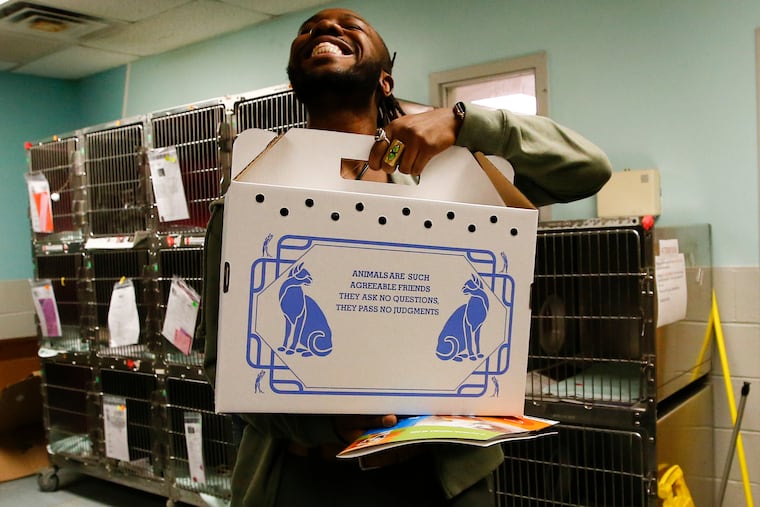Shelter pets in Philly are being fostered at ‘unprecedented’ rates amid the coronavirus, but the need is only expected to grow
“It is one tiny silver lining in all this — that an animal gets to go home from a shelter.”

The stay-at-home order hadn’t been issued yet, but Joshua Dufour could feel it coming.
“I’m preparing for them to mandate a quarantine, and I don’t want to go through it alone,” said Dufour, 25, of Olney.
So on Friday — just days before Mayor Jim Kenney issued his stay-at-home order to stem the spread of the coronavirus — Dufour went to ACCT Philly, the city’s animal shelter in North Philadelphia, to adopt his new roommate, a gray cat named Waffles.
Along with a home, the regal feline who was found wandering the streets of North Philly also got a new name, one worthy of his important work during these tough times — that of the Norse war god, Odin.
Over the last few weeks, Philadelphia’s animal shelters have seen foster applications pour in at extraordinary rates from humans seeking companionship during the age of self-quarantine.
“People are really stepping up,” said Aurora Velazquez, executive director of ACCT (Animal Care & Control Team) Philly. “The number of fosters is really unprecedented for this organization.”
At PAWS (Philadelphia Animal Welfare Society) — the city’s largest rescue partner — executive director Melissa Levy said they placed 123 animals into foster homes between March 15 and March 24, compared with 38 during the same time period last year.
“So many people are becoming fosters right now because they’re in such an unusual situation of being home and having time on their hands they don’t usually have,” Levy said. “It is one tiny silver lining in all this — that an animal gets to go home from a shelter.”
PSPCA (Pennsylvania Society for the Prevention of Cruelty to Animals) foster coordinator Maddie Bernstein usually receives three to five foster applications a week.
Now, she’s getting about 40 a day.
“The outpouring of fosters applications has just been insane, in a good way,” Bernstein said. “The more animals we have in foster care, the more space we have at the shelter to help other animals still in need."
But with most shelters doing appointment-only adoptions, or in the case of the PSPCA, none at all right now given heightened distancing restrictions, the adoption rate remains static.
The one thing all of Philly’s animal shelter workers stress is that as the stay-at-home orders continue — and people are forced to surrender their pets because of illness or financial hardship — the need for fosters, adoptions, and funding is expected to grow.
“Nothing is certain, but one thing we can be sure of is that there will probably be more homeless pets in the coming months if this goes on, and we have to save them because that’s our goal,” said Julie Klim, chief executive officer of the PSPCA.
Many of the shelters depend on public and private donations to survive, and with fund-raising events canceled for the foreseeable future, financial insolvency is a growing fear.
“We’re extremely concerned about our ability to meet expenses, which are increasing because of an increased need for cleaning supplies and protective gear for our staff,” Levy said. “It’s a precarious time. Our need for donations is always great, but it’s even greater now.”
Even Morris Animal Refuge — which placed all its animals, right down to the guinea pigs and gerbils, and was able to close its shelter doors — is still seeking donations to pay its employees and care for foster pets in placement homes.
Kait Dowling, 33, of Point Breeze, who fosters with Morris Animal Refuge, is spending her mandated stay-at-home days with Diesel, a 2-year-old Staffordshire Terrier-pit bull mix who’s proved to be “awesome company.”
As an internal consultant in the financial industry who is now working from home, Dowling said having a friendly, furry face around helps.
“He sleeps on the job frequently and he’s interrupted a couple of meetings, but he’s adjusting to work life," she said.
Diesel also provides Dowling with a regimen — and a reason to get out of the house — during these uncertain times.
“One of the best things is he has a schedule I have to be a part of,” Dowling said. “It’s good for me to get up at the same time, put his food together, and walk him.”
Several shelters continue to offer additional services as well, despite growing challenges. The PSPCA’s walk-in clinic, which usually services 20 to 30 families a day with sick pets, is still operating, but by appointment-only now, to limit the number of people at the facility.
And PSPCA’s humane law enforcement officers are still responding to animal cruelty calls, which remain on par with average numbers.
ACCT continues to maintain a pet food pantry for the public and the shelter is still taking in strays, every day. Last week alone, ACCT took in two pairs of baby pigs, a dog that needed a leg amputation, and a lovable pit bull mix named Whopper with a large mass on his stomach who was found wandering the streets of Philadelphia.
On Friday, as Whopper sized up his new surroundings, waiting for surgery, he didn’t seem concerned about the large growth on his tummy. He just seemed happy to not be alone anymore.
“He’s your typically Philly dog,” said ACCT director of operations Adam Bates. “He’s big and blocky-headed, but willing to roll with the punches.”
With more people stepping forward to foster pets than ever, Bates said he’d like to see the trend continue, long after the coronavirus is gone.
“I hope this will be a proof of concept to these new fosters," he said, "and maybe, they’ll do it again.”